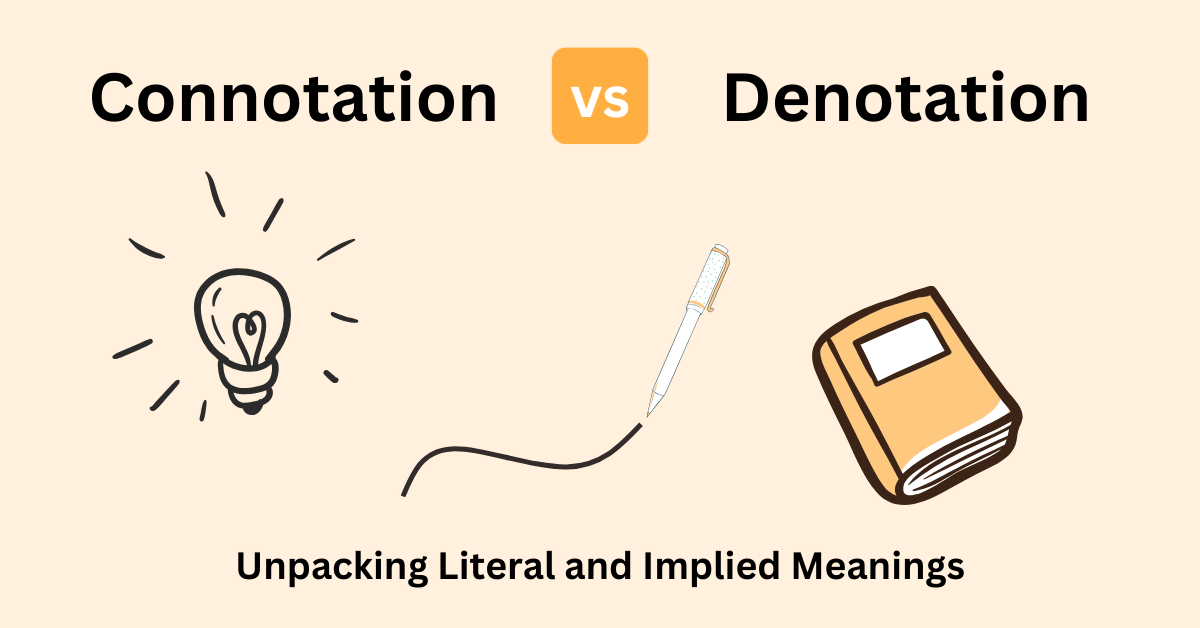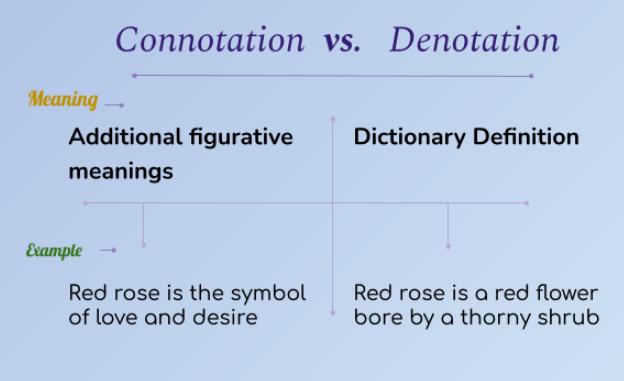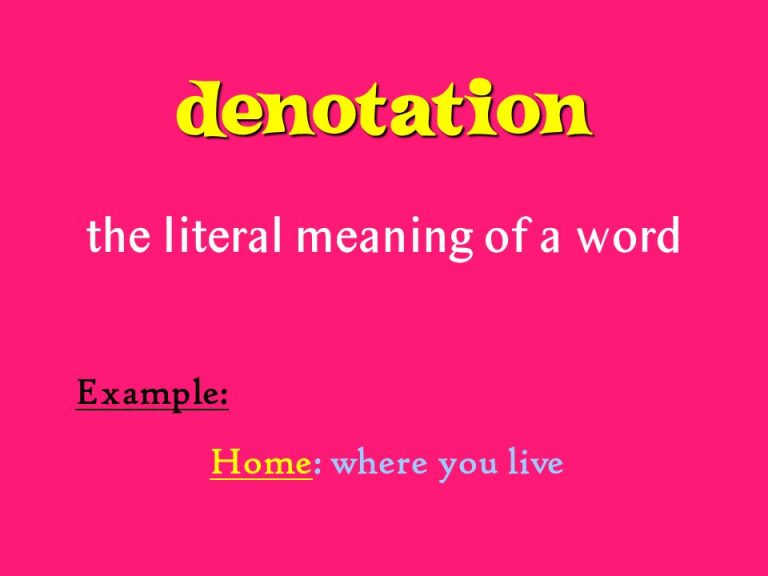Understanding denotation literary definition simple concepts can transform your reading experience forever. Most students struggle with literary terms because teachers make them sound complicated.
But denotation is actually one of the easiest literary devices to master.
When you know what words literally mean versus what they suggest, you unlock the secret code of every book, poem, and story.
This guide breaks down denotation in plain English with real examples you’ll remember.
Let’s dive in.

What Is Denotation in Literature?
Denotation refers to the literal, dictionary definition of a word.
It’s the exact meaning without any emotional baggage or hidden suggestions.
Think of denotation as the “straight facts” about what a word means.
When you look up a word in the dictionary, you’re reading its denotation.
For example, the denotation of “snake” is simply “a long, legless reptile.”
That’s it.
No scary feelings, no evil associations, just the basic biological fact.
Denotation literary definition simple explanations always focus on objective meaning.
Writers use denotative language when they want to be crystal clear about something.
Scientific writing, news reports, and instruction manuals rely heavily on denotative language.
The goal is precise communication without confusion.
Denotation vs Connotation: The Key Difference
Here’s where things get interesting.
Denotation is what a word literally means.
Connotation is what a word makes you feel or think about.
Let’s use “snake” again as our example.
Denotation of “snake”: A long, legless reptile
Connotation of “snake”: Evil, dangerous, sneaky, untrustworthy
See the difference?
The denotation stays the same in every dictionary.
But connotations can change based on culture, personal experience, and context.
This is why understanding denotation literary definition simple concepts matters so much.
Writers play with both denotation and connotation to create powerful effects.
When a character calls someone a “snake,” they’re using the connotation (sneaky, untrustworthy).
But the denotation (reptile) creates an interesting comparison.
Why Denotation Matters in Literature
- Smart readers pay attention to denotation for several reasons.
- First, it helps you understand what’s actually happening in a story.
- Sometimes writers use fancy words that sound impressive but mean something simple.
- Breaking down the denotation helps you cut through the fluff.
- Second, denotation creates a foundation for understanding deeper meanings.
- You can’t grasp symbolism or metaphor without knowing the literal meaning first.
- Third, comparing denotation to connotation reveals the author’s choices.
- When writers choose words with strong connotations, they’re doing it on purpose.
- Finally, denotation helps you become a more precise communicator yourself.
- Understanding exact word meanings makes your own writing clearer and stronger.
Simple Examples of Denotation in Literature
Let’s look at some easy examples that show denotation in action.
Example 1: “The Rose”
Denotation: A flowering plant with thorns
In literature: Often used to represent love or beauty
Why it matters: Authors choose “rose” over “flower” because roses have specific connotations
Example 2: “Home”
Denotation: A place where someone lives
In literature: Can mean safety, comfort, belonging, or family
Why it matters: The simple denotation creates a foundation for emotional meaning
Example 3: “Fire”
Denotation: Rapid oxidation releasing heat and light
In literature: Often represents passion, destruction, or purification
Why it matters: The literal process of burning gives power to symbolic meanings
Example 4: “Dove”
Denotation: A small bird in the pigeon family
In literature: Symbol of peace, love, or the Holy Spirit
Why it matters: The gentle nature of the actual bird supports its symbolic uses
These examples show how denotation literary definition simple understanding helps you decode literature.
How to Identify Denotation in Any Text
Here’s a step-by-step process that works every time.
Step 1: Find the unfamiliar or important words
Look for words that seem significant to the story or poem.
Pay special attention to repeated words or unusual word choices.
Step 2: Look up the dictionary definition
Don’t guess at meanings.
Use a reliable dictionary to find the exact denotation.
Step 3: Consider the literal meaning in context
How does the dictionary definition fit into the sentence?
Does the literal meaning make sense in the story?
Step 4: Notice any gap between literal and suggested meaning
If the literal meaning seems too simple or doesn’t match the tone, look for connotations.
Step 5: Ask why the author chose this specific word
Could they have used a synonym with the same denotation?
Different word choices often reveal the author’s intent.
This process helps you understand denotation literary definition simple concepts in any text.

Common Denotation Mistakes Students Make
Avoiding these mistakes will improve your literary analysis immediately.
Mistake 1: Assuming you know what common words mean
Words like “love,” “freedom,” and “justice” have specific denotations.
Don’t assume you know the exact definition without checking.
Mistake 2: Ignoring historical context
Word meanings change over time.
A word’s denotation in Shakespeare’s time might differ from today’s definition.
Mistake 3: Confusing denotation with connotation
Remember: denotation is literal, connotation is suggested.
Don’t mix up these two crucial concepts.
Mistake 4: Skipping dictionary work
Looking up words feels like extra work, but it’s essential.
Even words you think you know might have surprising denotations.
Mistake 5: Forgetting about multiple meanings
Many words have several denotations.
Consider all possible literal meanings when analyzing literature.
Advanced Denotation Techniques in Literature
Once you master basic denotation, you can explore these advanced concepts.
Semantic Fields
- Authors often choose words from the same semantic field (topic area).
- For example, war poetry might use words with denotations related to conflict, weapons, or violence.
- The denotations work together to create atmosphere.
Archaic Denotations
- Some authors deliberately use words with outdated denotations.
- This creates a sense of history or formality.
- Understanding old meanings helps you appreciate the author’s craft.
Technical Denotations
- Scientific or professional terms have very specific denotations.
- Authors use these for precision or to show a character’s expertise.
Cultural Denotations
- Some words have different denotations in different cultures.
- This is especially important in translated literature.
Denotation in Different Literary Genres
Different types of literature use denotation in unique ways.
Poetry
- Poets choose words for both denotation and sound.
- The literal meaning provides foundation while rhythm and rhyme add beauty.
- Denotation literary definition simple understanding helps you appreciate both layers.
Drama
- Playwrights use denotation to create clear dialogue.
- Characters must communicate effectively with the audience.
- But subtext (connotation) often carries the real meaning.
Fiction
- Novelists balance denotation with connotation throughout long narratives.
- Clear denotation keeps readers oriented in the story world.
- Rich connotations add depth and emotion.
Non-fiction
- Essays and memoirs rely heavily on denotative language.
- Precise word choice helps authors make clear arguments.
- But even factual writing can use connotation for persuasion.
Practical Exercises to Master Denotation
Try these exercises to strengthen your denotation skills.
Exercise 1: Dictionary Deep Dive
- Choose five important words from a text you’re reading.
- Look up each word in three different dictionaries.
- Compare the denotations and note any differences.
Exercise 2: Synonym Comparison
- Find a passage with rich vocabulary.
- Replace key words with synonyms that have similar denotations.
- Notice how the meaning changes even with “equivalent” words.
Exercise 3: Denotation vs Connotation Chart
- Create a two-column chart for significant words in a text.
- List the denotation in one column and connotations in the other.
- This visual approach helps you see the relationship clearly.
Exercise 4: Historical Word Hunt
- Research the historical denotations of archaic words in older texts.
- See how meanings have shifted over time.
- This exercise improves your understanding of language evolution.
Technology and Denotation Analysis
Modern tools can help you understand denotation more effectively.
Online Dictionaries
- Websites like Merriam-Webster and Oxford provide comprehensive denotations.
- Many include etymology (word history) that explains meaning development.
Corpus Analysis Tools
- These programs analyze how words are actually used in literature.
- They show you denotation patterns across thousands of texts.
AI Writing Assistants
- Tools like Grammarly can flag words with unclear denotations.
- They suggest more precise alternatives for better communication.
Digital Annotation Tools
- Apps let you highlight and define words while reading.
- Build your own denotation database for future reference.
Common Denotation Patterns in Literature
Recognizing these patterns improves your analytical skills.
Religious Denotations
- Many texts use words with religious denotations even in secular contexts.
- Words like “salvation,” “redemption,” and “grace” carry specific literal meanings.
Natural World Denotations
- Authors frequently choose words denoting natural phenomena.
- Understanding botanical, geological, and astronomical terms enhances comprehension.
Body Part Denotations
- Physical descriptions often use precise anatomical denotations.
- This creates vivid imagery and can suggest deeper meanings.
Color Denotations
- Specific color words have exact denotations that differ from general terms.
- “Crimson” vs “red” vs “scarlet” – each has a distinct literal meaning.
Building Your Denotation Vocabulary
Systematic vocabulary building improves your literary analysis.
Read Widely
- Exposure to different genres and time periods expands your denotation knowledge.
- Each new context teaches you subtle meaning differences.
Keep a Word Journal
- Record new words with their denotations and example sentences.
- Review regularly to reinforce your learning.
Use Flashcards
- Create cards with words on one side and denotations on the other.
- This active recall method strengthens memory.
Practice Etymology
- Learning word origins helps you understand current denotations.
- Many meanings become clearer when you know historical development.

The Future of Denotation in Literature
Understanding denotation remains crucial even as language evolves.
Digital Literature
- Online texts and e-books make dictionary lookup easier than ever.
- This accessibility helps readers engage with complex denotations.
Multilingual Literature
- Global literature requires understanding denotations across cultures.
- Translation challenges make precise meaning more important.
AI and Literature
- As AI writes more content, understanding human denotation choices becomes valuable.
- This skill helps distinguish human creativity from machine generation.
FAQs
What is a denotation in simple terms?
Denotation is the literal, dictionary definition of a word.
It’s the objective meaning, without emotion or added context.
What is the literary definition of denotation?
In literature, denotation refers to a word’s explicit, direct meaning.
Writers often contrast it with connotation, the implied meaning.
What is an example of a simple denotation?
The word “snake” denotes a slithering reptile.
That’s its literal meaning, not the symbolic one.
What is meant by denotative?
Denotative means relating to a word’s literal meaning.
It describes the precise, unemotional definition of a term.
What is the denotation of simple?
The denotation of “simple” is easy to understand or do.
It means not complex or uncomplicated.
What is the simple definition of connotation?
Connotation is the emotional or cultural meaning behind a word.
It’s what the word suggests or implies, beyond its literal definition.
Conclusion
Denotation literary definition simple mastery opens doors to deeper literary understanding.
You now have the tools to identify, analyze, and appreciate exact word meanings.
Remember that denotation provides the foundation for all other literary analysis.
Start with literal meanings, then explore the layers of suggestion and emotion.
Practice these techniques with every text you read.
Soon, you’ll automatically notice when authors make precise word choices.
This skill will improve your reading comprehension, writing ability, and critical thinking.
The journey from confused reader to confident literary analyst starts with understanding what words actually mean.
Master denotation, and you’ll unlock the full power of literature.
Your future self will thank you for building this essential skill today.

